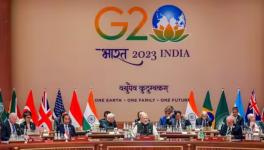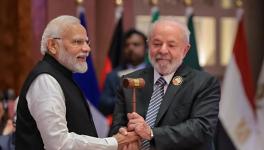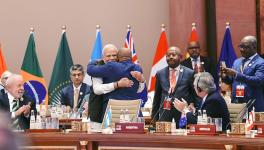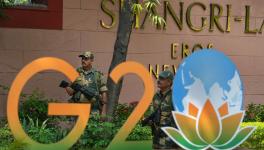G20 is dead. Long live G20!
US president Joe Biden (R) and Chinese president Xi Jinping met at Bali, Nov 14, 2022. Biden said they discussed their responsibility to prevent competition and find ways to work together.
The seventeenth G20 Heads of State and Government Summit held in Bali, Indonesia, on November 15-16 stands out as a consequential event from many angles. The international politics is at an inflection point and the transition will not leave unaffected any of the institutions inherited from the past that is drifting away forever.
However, the G20 can be an exception in bridging time past with time present and time future. The tidings from Bali leave a sense of mixed feelings of hope and despair. The G20 was conceived against the backdrop of the financial crisis in 2007 — quintessentially, a Western attempt to burnish the jaded G7 by bringing on board the emerging powers that stood outside it looking in, especially China, and thereby inject contemporaneity into global discourses.
The leitmotif was harmony. How far the Bali summit lived up to that expectation is the moot point today. Regrettably, the G7 selectively dragged extraneous issues into the deliberations and its alter ego, North Atlantic Treaty Organisation (NATO), made its maiden appearance in the Asia-Pacific. Arguably, the latter must be counted as a fateful happening during the Bali summit.
What happened is a negation of the spirit of the G20. If the G7 refuses to discard its bloc mentality, the cohesion of the G20 gets affected. The G7-NATO joint statement could have been issued from Brussels or Washington or London. Why Bali?
The Chinese President Xi Jinping was spot on saying in a written speech at the APEC CEO Summit in Bangkok on November 17 that “The Asia-Pacific is no one’s backyard and should not become an arena for big power contest. No attempt to wage a new Cold War will ever be allowed by the people or by the times.”
Xi warned that “Both geopolitical tensions and the evolving economic dynamics have exerted a negative impact on the development environment and cooperation structure of the Asia-Pacific.” Xi said the Asia-Pacific region was once a ground for big power rivalry, had suffered conflicts and war. “History tells us that bloc confrontation cannot solve any problem and that bias will only lead to disaster.”
The golden rule that security issues do not fall within the purview of G20 has been broken. At the G20 summit, the Western countries held the rest of the participants at the Bali summit to ransom: ‘Our way or no way’. Unless the intransigent West was appeased on Ukraine issue, there could be no Bali declaration, so, Russia relented. The sordid drama showed that the DNA of the Western world hasn’t changed. Bullying remains its distinguishing trait.
But, ironically, at the end of the day, what stood out was that the Bali Declaration failed to denounce Russia on the Ukraine issue. Countries such as Saudi Arabia and Turkey give reason for hope that G20 can regenerate itself. These countries were never Western colonies. They are dedicated to multipolarity, which will ultimately compel the West to concede that unilateralism and hegemony is unsustainable.
This inflection point gave much verve to the meeting between US President Joe Biden and Chinese President Xi Jinping at Bali. Washington requested for such a meeting on the sidelines of the G20 summit, and Beijing consented. One striking thing about the meeting has been that Xi was appearing on the world stage after a hugely successful Party Congress.
The resonance of his voice was unmistakable. Xi underscored that the US has lost the plot, when he told Biden: “A statesman should think about and know where to lead his country. He should also think about and know how to get along with other countries and the wider world.” (here and here)
The White House readouts hinted that Biden was inclined to be conciliatory. The US faces an uphill challenge to isolate China. As things stand, circumstances overall work to China’s advantage. (here , here and here)
The majority of countries have refused to take sides on Ukraine. China’s stance amply reflects it. Xi told Biden that China is ‘highly concerned’ about the current situation in Ukraine and support and look forward to a resumption of peace talks. That said, Xi also expressed the hope that the US, NATO and the EU ‘will conduct comprehensive dialogues’ with Russia.
The fault lines that appeared at Bali may take new forms by the time the G20 holds its 18th summit in India next year. There is reason to be cautiously optimistic. First and foremost, it is improbable that Europe will go along with the US strategy of weaponising sanctions against China. They cannot afford a decoupling from China, which is the world’s largest trading nation and the principal driver of growth for the world economy.
Second, much as the battle cries in Ukraine rallied Europe behind the US, a profound rethink is under way. Much agonising is going on about Europe’s commitment to strategic autonomy. The recent visit of German Chancellor Olaf Scholz to Germany pointed in that direction. It is inevitable that Europe will distance itself from the US’ cold war aspirations. This is inevitable in a world where the US is not inclined to spend time, money or effort on its European allies.
The point is, in many ways, America’s capacity to provide effective global economic leadership has irreversibly diminished, having lost its pre-eminent status as the world’s largest economy by a wide margin. Besides, the US is no longer willing or capable of investing heavily in shouldering the burden of leadership. Simply put, it still has nothing on offer to match China’s Belt and Road Initiative. This should have had a chastening influence and prompted a change of mindset toward cooperative policy actions, but the American US elite are stuck in the old groove.
Fundamentally, therefore, multilateralism has become much harder in the present-day world situation. Nonetheless, the G20 is the only game in town to bring together the G7 and the aspiring developing countries who stands to gain out of a democratised world order. The Western alliance system is rooted in the past. The bloc mentality holds little appeal to the developing countries. The gravitation of Turkey, Saudi Arabia and Indonesia toward the BRICS conveys a powerful message that the Western strategy in conceiving the G20 — to create a ring of subaltern states around the G7 — has outlived its utility.
The dissonance that was on display in Bali exposed that the US still clings to its entitlement and is willing to play the spoiler. India has a great opportunity to navigate the G20 in a new direction. But it requires profound shifts on India’s part too –away from its US-centric foreign policies, coupled with far-sightedness and a bold vision to forge a cooperative relationship with China, jettisoning past phobias and discarding self-serving narratives, and, indeed, at the very least, avoiding any further descent into beggar-thy-neighbour policies.
Get the latest reports & analysis with people's perspective on Protests, movements & deep analytical videos, discussions of the current affairs in your Telegram app. Subscribe to NewsClick's Telegram channel & get Real-Time updates on stories, as they get published on our website.
























